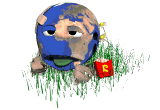 In
Greek "oikos” means home, place where we live. And ecology means
the science of how all living creatures interact within the place we live in
- our environment. The environment as a whole. We are part of the earth and
not separate from it. Mankind, plants and animals are striving to cohabite on
this earth each one in the most dominant possible way. Yet the survival of all
species, is reliant upon the harmony of the existence of all beings on this
earth. We have to consider both the biotic and abiotic aspects of the natural
world. Therefore it is important to understand their bi-directional relationships.
The physical world influences living organisms and organisms effect the physical
world. The main part of the science of ecology is the understanding of the processes,
interactions and relationships of all given entities rather than the perfect
understanding of each one of them.
In
Greek "oikos” means home, place where we live. And ecology means
the science of how all living creatures interact within the place we live in
- our environment. The environment as a whole. We are part of the earth and
not separate from it. Mankind, plants and animals are striving to cohabite on
this earth each one in the most dominant possible way. Yet the survival of all
species, is reliant upon the harmony of the existence of all beings on this
earth. We have to consider both the biotic and abiotic aspects of the natural
world. Therefore it is important to understand their bi-directional relationships.
The physical world influences living organisms and organisms effect the physical
world. The main part of the science of ecology is the understanding of the processes,
interactions and relationships of all given entities rather than the perfect
understanding of each one of them.My personal reflection is, if the environment breaks down, our soul starts to die. The human being is anchored to the world with body and soul. Our highest commitment on earth is (and here I am talking about the western civilisation, hence in other cultures different understandings of the simple “being” exist), to enable the continuance of that, which was given to us (in the biblical sense).
From the very beginning the human being was fascinated by nature. Already Plato had a very distinguished idea about the thought of nature. He defended the viewpoint that man having a soul represented “something higher” and that hence his integration into the environment was only partially necessary. Philosophers of nature seemed to be a danger to progress. Only with time the understanding of nature changed. Up to the development of capitalism humans regarded nature as something static, unchangeable. It was the perfection of divine creation and could thus take no damage by humans beings.
By the glaring interferences of humans into the environment during the period of industrialization, man began slowly to take consience that human beings do affect nature. The modern evolution theory was born during that period.
Humans have the tendency to regard their spirit as very important and thus often understand that they can lift themselves above all given borders. The soul however notices, in my point of view, only to frequently the gap between these two contrasts and looks for the agreement between the body and the spirit with our nature. Perhaps you know this also from the speech of the chief of Seattle to the president of the United States of America in the year 1855. There he pointed out:
“Our dead never forget this beautiful earth, for it is the mother of the red man. We are part of the earth and it is part of us. The perfumed flowers are our sisters; the deer, the horse, the great eagle, these are our brothers. The rocky crests, the juices in the meadows, the body heat of the pony, and man--all belong to the same family.”
With this approach we enter into another dimension. Two distinguished approaches of ecology are:
The scientific ecology : the science of the relationships of the biotic and abiotic enivronment, as seen above. We are an outside observer, we get facts and data and we try to analyse them.
The deep ecology: We see ourselves as part of the earth. We ask ourself deep inside, where we have our place and role in protecting our own home – oikos.
 Ecology
is economy on a long-term basis. To be nowadays an integral part of the ecological
process requires the understanding of the responsibility for our own actions.
Our perspicacity today is determining for our way of living of tomorrow. The
rapid growing of the world population, the exhaustion of natural resources by
their excessive use in certain areas of the world, as well as a lack of comprehension
of the ecological interactions threaten already and will threaten our survival
in the near future. To reach a balance in the handling of all the entries and
exits (input/output) in the respect of the natural environnement in a near future
is an incontestably obvious condition for the safeguard and amelioration of
the world economy. If efficiency was improved and optimized
(not maximized) by taking into consideration all of the production
factors (also the sustainability of natural ressources and descend possibilities
of living for all individuals on this planet) on all levels of our companies,
the companies would carry out an important economic profit though preserving
the environment.
Ecology
is economy on a long-term basis. To be nowadays an integral part of the ecological
process requires the understanding of the responsibility for our own actions.
Our perspicacity today is determining for our way of living of tomorrow. The
rapid growing of the world population, the exhaustion of natural resources by
their excessive use in certain areas of the world, as well as a lack of comprehension
of the ecological interactions threaten already and will threaten our survival
in the near future. To reach a balance in the handling of all the entries and
exits (input/output) in the respect of the natural environnement in a near future
is an incontestably obvious condition for the safeguard and amelioration of
the world economy. If efficiency was improved and optimized
(not maximized) by taking into consideration all of the production
factors (also the sustainability of natural ressources and descend possibilities
of living for all individuals on this planet) on all levels of our companies,
the companies would carry out an important economic profit though preserving
the environment.